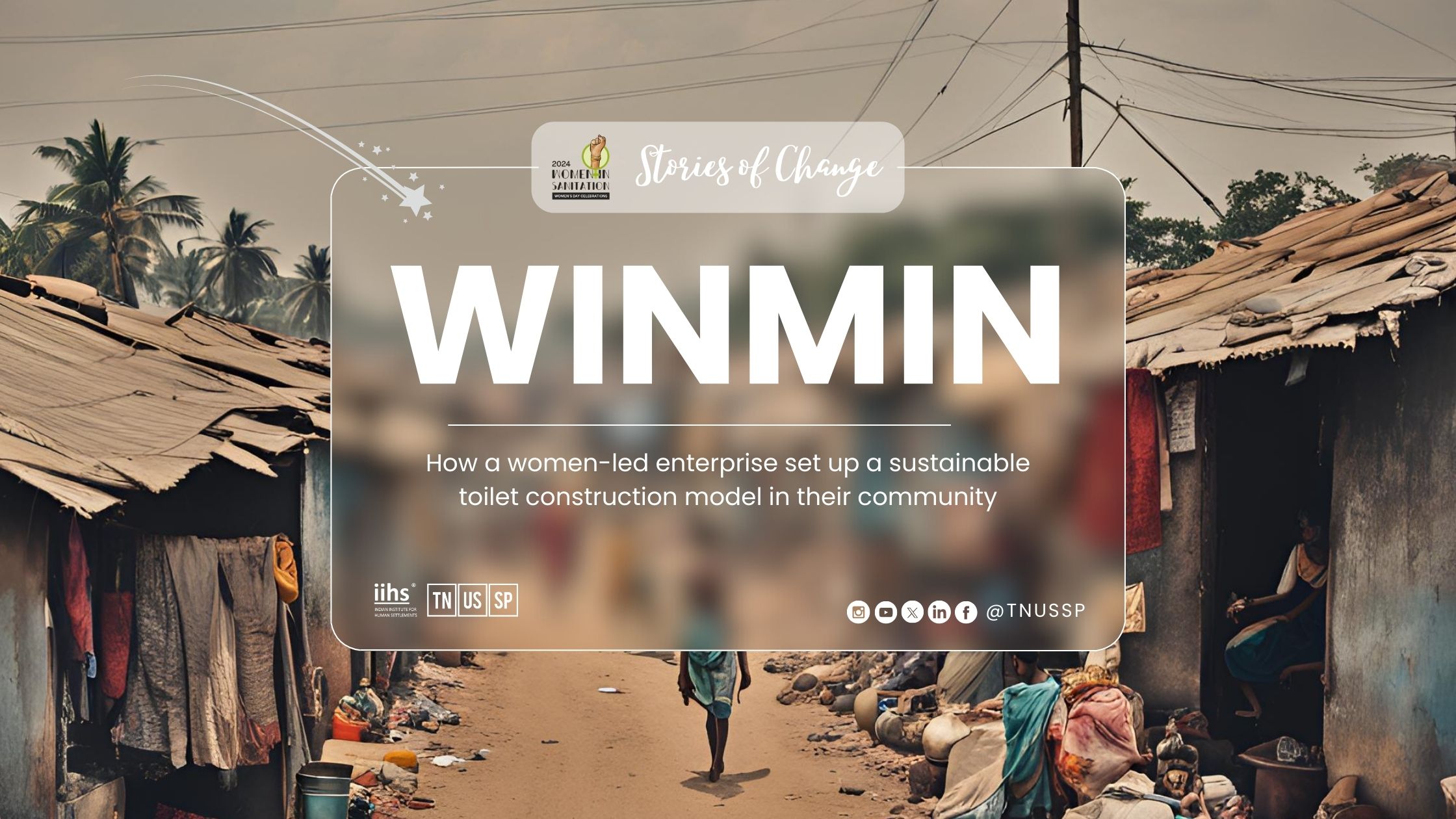Indira Nagar, Tiruchirappalli, is home to approximately 200 households composed entirely of ragpickers and scrap dealers. For many years, the community has struggled with accessing proper sanitation facilities, with the only option being the poorly maintained community toilets. What’s more, the Open Defecation Free status of Trichy City meant next to no funds being allocated for sanitation, leaving the Indira Nagar residents no choice but to take matters into their own hands.
Thus, in 2018, a few households took the initiative to construct individual toilets under the Swachh Bharat Mission. Alas, Indira Nagar is surrounded by water, with a pond on one side and the Cauvery tributary Korai Aaru on the other, which led to high groundwater levels. This, alongside the inadequate containment systems (the residents had built ring-type containment structures with no proper septic tanks), made the toilets unusable, eventually forcing residents to resort to open defecation along the margins of the pond.
However, it was ultimately the occurrence of two harrowing incidents that awakened the community members to the dangers of such sanitation practices. First, a nine-year-old girl who was defecating in the open died tragically after being bitten by a snake. Soon after, another young girl who was using a community toilet was sexually harassed by neighbourhood boys, and her pictures circulated. These incidents sent tremors through the tight-knit community of Indira Nagar, signalling the need for urgent and decisive action.
In 2023, when the Indian Institute for Human Settlements (IIHS) conducted a site visit to the area and uncovered its woeful state of affairs, it proposed an intervention: the residents of Indira Nagar would form self-help groups (SHGs), comprised entirely of women, to construct individual household toilets. While its theory of change was straightforward, getting the community to agree to this course of action was not. The IIHS team spent many days with the community’s women, motivating them to become the much-needed agents of change and reassuring them of the organisation’s institutional support at every step of the way. Thus emerged six new women-led SHGs from Indira Nagar.
The SHG members found their unlikely leader in a reserved homemaker: Rajeshwari, previously too meek to even step out of home, became a unifying force. She brought all the SHGs together to constitute a toilet construction enterprise, which they named WinMin (‘shooting star’ in Tamil). WinMin’s goal was to construct individual household toilets that took the community’s unique needs into account; these were labelled ‘aspirational toilets’ since they aimed to fulfil the households’ aspirations – ones of proper washrooms, bathing facilities, and privacy.
There was no dearth of challenges on WinMin’s path but its members faced them head-on. The women were only momentarily intimidated by the extensive legal documentation required to register their enterprise. With IIHS’s support, they set up a current account at the bank, procured a PAN card, and successfully registered WinMin. Having seen the pitfalls of poor containment up close, the women were keen on being fully trained on building structurally sound toilets immune to flooding. To aid with this, IIHS trained them on the nitty-gritty of masonry, roofing options etc. The women also became financially literate, undergoing training on understanding material rates, account maintenance, and tax processes.
By the end of these sessions, the WinMin women had become successful technicians adept at running their business. With added support from IIHS and the state administration, their enterprise became a well-oiled machine. Funds allocated for sanitation were meticulously utilised with no diversions whatsoever. A revolving method of repayments was devised, where the SHGs within the enterprise borrow from and repay each other, to ensure sustainability.
The women’s hard work has already begun to pay off. Nine toilets have been successfully completed in Indira Nagar, and two more are underway. The district collector’s inauguration of the completed toilets was a moment of pride for WinMin and a significant milestone in the community’s journey towards improved sanitation.
What’s next?
A study of the area revealed that 100 of the 200 households with room for toilets are interested in individual toilets. Since the primary obstacle is that of funding, IIHS is helping the SHGs procure investments through the National Urban Livelihoods Mission (NULM). Emboldened by their success, WinMin is now extending its support to other low-income settlements in Trichy, while working steadily towards its goal of building 100 household toilets over the next year in Indira Nagar.
About Women In Sanitation’s Stories of Change
IIHS-TNUSSP’s Women in Sanitation is a year-long initiative celebrating the invaluable contributions of women professionals in India’s sanitation sector. Now in its fifth year, we continue to amplify the often-overlooked voices of women who play diverse roles across the sanitation chain through impactful articles and films.
Introducing “Stories of Change,” a vibrant new addition to our campaign that unveils the poignant narratives of Tamil women who are shaping the sanitation landscape. Dive into their personal triumphs and discover the profound impact they bring to their communities. If you know of someone whose story deserves recognition, reach out to us at tnussp@iihs.ac.in.
Acknowledgements
Written and Designed by Suhasini Udayakumar, External Consultant – Communications, IIHS


Leave A Comment
You must be logged in to post a comment.